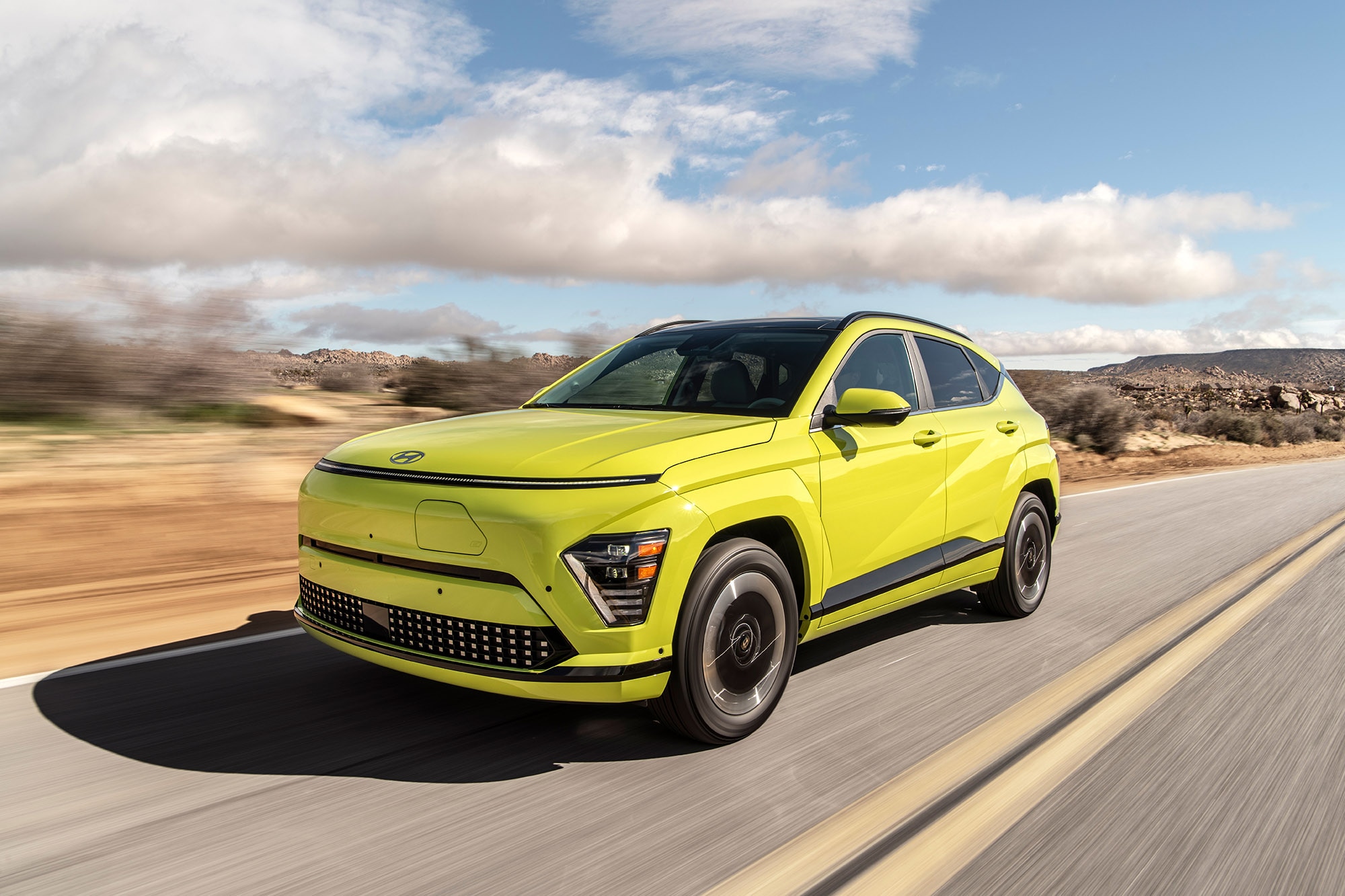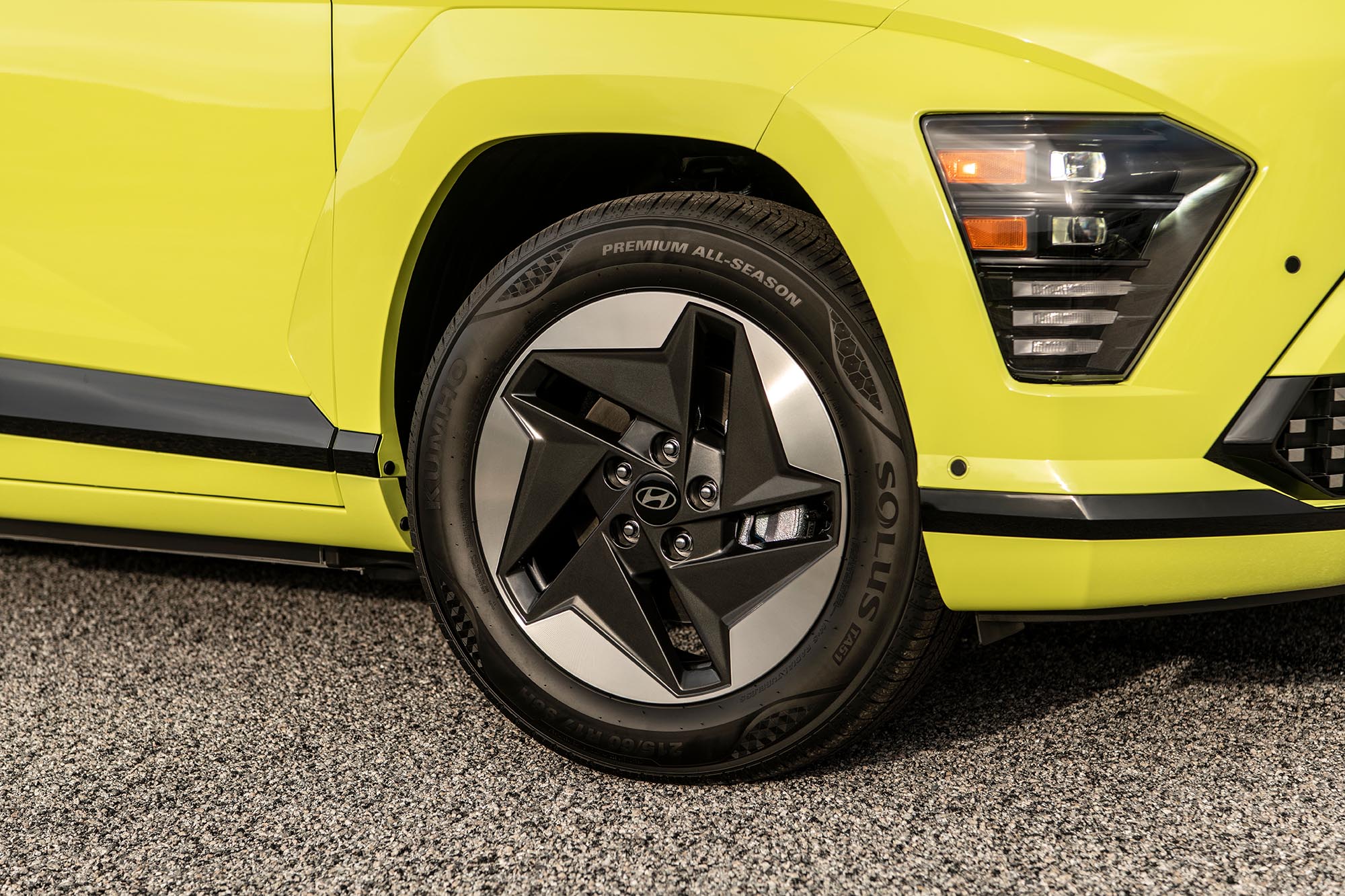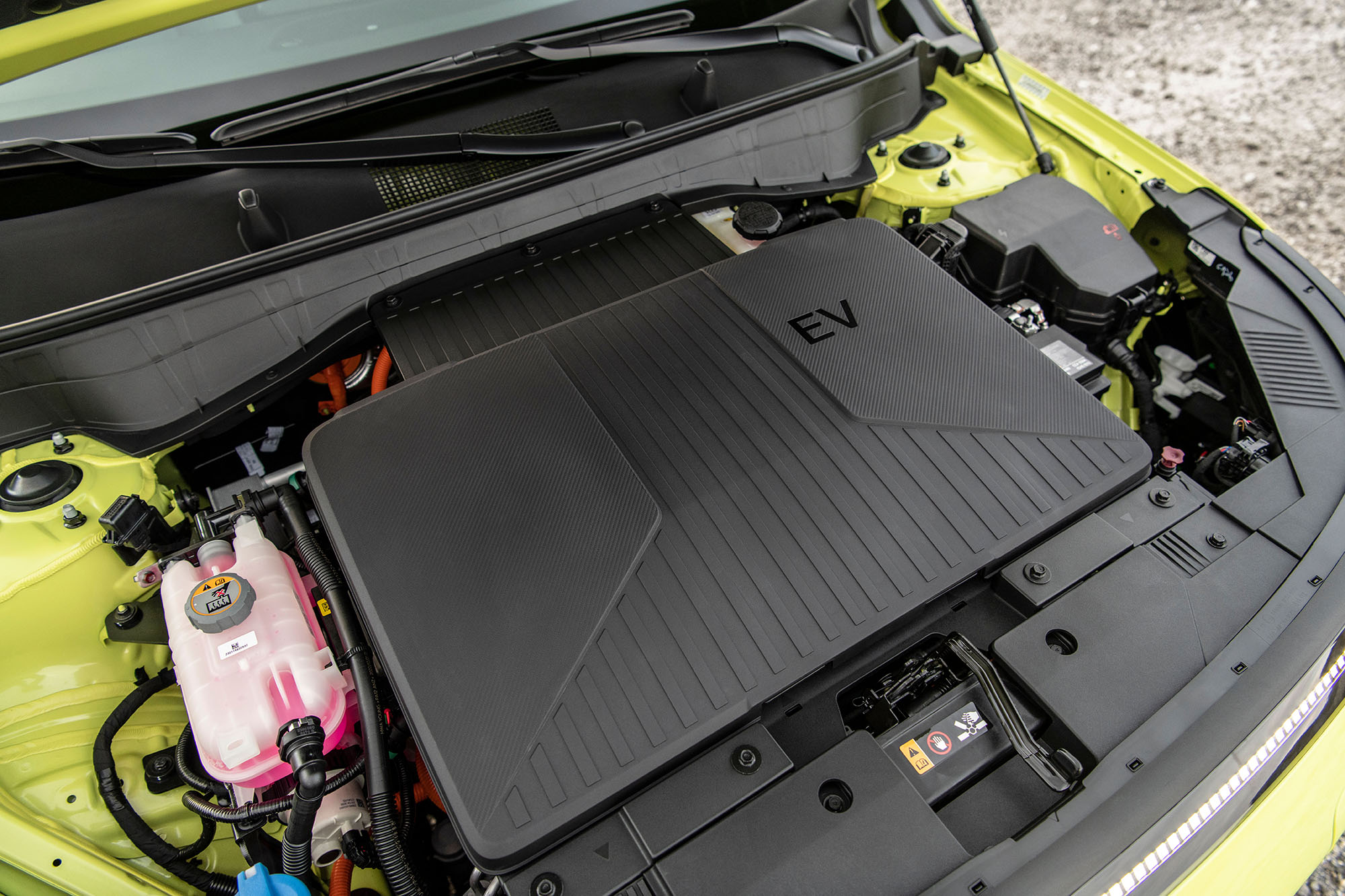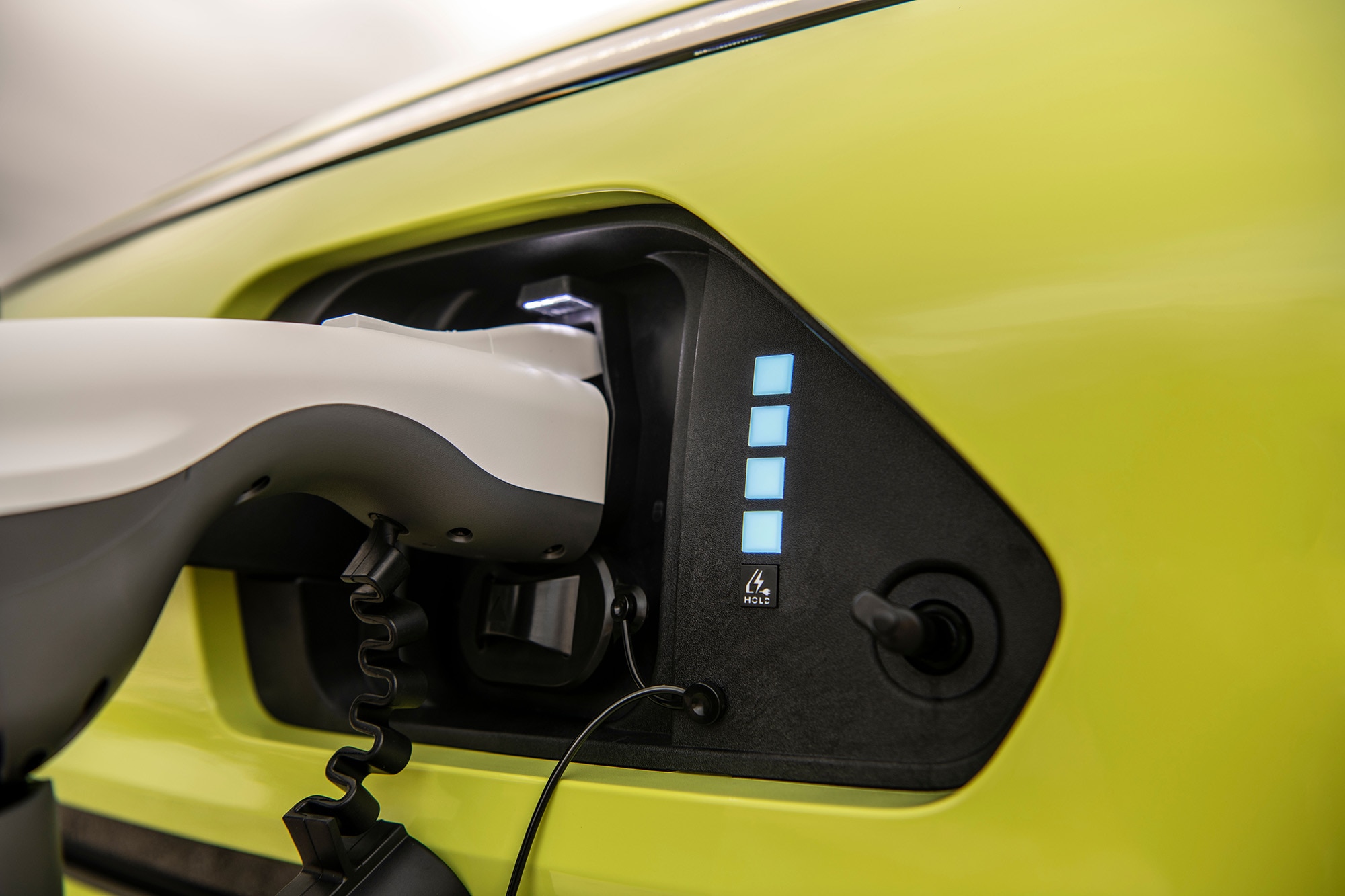EV Tires: Everything You Need to Know
Tires designed specifically to meet the demands of electric vehicles may differ from conventional rubber.
 Hyundai
Hyundai
Electric vehicles differ from their fossil fuel-powered counterparts in a number of significant ways. They're heavier, for one thing, due in part to the large battery packs that power them. They're also quieter, because electric motors make far less noise than engines that burn fuel.
EVs are usually capable of powerful acceleration, especially from a stop. As for EV owners, they often want to be able to go as far as possible before having to recharge.
All of these factors come into play where the rubber meets the road. That's why electric carmakers partner with tire companies to engineer tires that are EV optimized. Here's what you need to know about tires made for EVs — and what to consider when replacing the tires on your own EV.
EV Tires Must Be Able to Cope With Heavier Cars
Most U.S. drivers are accustomed to internal-combustion-engine (ICE) vehicles that can go 200 to 400 miles between fill-ups, and EV carmakers have been working to deliver similar electric range. That requires bigger, heavier battery packs than would be needed for shorter trips alone.
For instance, the electric version of the 2024 Hyundai Kona can weigh almost 900 pounds more than its gasoline-fueled counterpart, nearly a 30% increase. EV tires need to have stiffer sidewalls and more robust rubber tread to handle this added heft.
 Hyundai
Hyundai
Quieter Cars Require Quieter Tires
Drive an ICE vehicle and an EV back to back, and the first difference you'll likely notice is the noise — or rather, the lack of it. Electric vehicles are far quieter than conventional cars. This is great for occupants, but it presents a huge challenge for tire manufacturers. Without the background noise of a thrumming engine, every other sound becomes more pronounced, including the sound of the tires rolling along the pavement.
EV-specific tires use a few engineering tricks to minimize that road noise. Many tire companies add a layer of squishy foam to the insides of their EV tires to absorb noise that otherwise would be transmitted to the cabin.
Other solutions require more advanced engineering. As Jason Fenske, host of the Engineering Explained YouTube channel, explains in a video, EV tires often use a unique tread pattern (the layout of the slits and channels in the tire) to minimize sound.
These may seem like small changes, but they can make a big difference to your ears. On his YouTube channel, Fenske conducted back-to-back tests with conventional and EV-specific tires on his electric sedan. Using a sophisticated sound sensor, Fenske found that the EV-specific tires were 25% quieter than the conventional tires — a noticeable difference for a vehicle that's pretty quiet to begin with.
 Hyundai
Hyundai
EV Tires Are Engineered to Squeeze Out Extra Range
Car buyers often cite range anxiety as one of the biggest hurdles to switching to an EV. With that in mind, automakers work to squeeze every possible mile out of their EV batteries. That's where the rubber formulation used in EV tires comes into play.
"Typically for EVs, what we've found is ... there's an increased focus on the rolling resistance of the tire," said Will Robbins, director of consumer product strategy at Bridgestone tire company. "Range for EVs, that's directly affected by tire rolling resistance."
Rolling resistance is a measure of the amount of energy it takes to keep a tire rolling down the road — in other words, the force required to overcome the friction of the tire against the pavement. The challenge lies in reducing rolling resistance without also reducing the grip and traction needed to keep you in control through all kinds of driving conditions.
A 10% reduction in rolling resistance can lead to a 1% improvement in energy efficiency, according to independent product research publication Consumer Reports. In an EV, every percent improvement counts.
In his video on EV-specific tires, Fenske explains this from the opposite direction: If an electric carmaker decided to switch to a high-rolling-resistance tire and wanted to keep the battery range the same, the car might need an additional 10% to 12% of battery capacity. That would increase the cost to build the vehicle and add considerable weight, which would, of course, affect range.
EV Tires Must Be Able to Handle Rapid Acceleration
Even an efficiency-minded EV can have sports-car-like acceleration from a stop. That means EV tires need to provide excellent traction so drivers won't screech and skid away from every stop sign. A tire that's optimized for electric vehicles may use different rubber compounds or tread designs than a conventional tire to maintain grip under this rapid EV acceleration.
"At the end of the day, you can do a lot of tuning on a car, but the tire is the only thing that creates the grip," Robbins said. "The suspension helps optimize that traction, but we're really the ones that have that last say as far as how fast you're able to go."
 Hyundai
Hyundai
What to Know When Replacing Your Own EV Tires
Custom-tailored EV tires are built to handle heavier vehicles while running quietly, giving the best battery range, and providing superior grip. But what happens when it's time to replace the factory-installed tires on your own EV? If you can't find those electric-optimized tires, is it safe to use a conventional replacement?
From a safety standpoint, the most important thing is to find tires that are the correct size and weight rating for your vehicle. Your dealership service center or a reputable tire shop will likely check that a tire conforms to these specs before offering it to you. You can also use traction and treadwear ratings to guide your purchase.
Custom-blend EV tires that prioritize low rolling resistance often come with a downside: The tires wear out faster. A conventional replacement tire could be the answer, Robbins said, for customers who are willing to trade a bit of range performance for much better wear performance.
If the factory-fit tires met all or most of your expectations, your dealership service center or a big-name tire shop should be able to find the exact EV-rated replacements or guide you toward something that offers any improvements you might desire.
Written by humans.
Edited by humans.
 Bob Sorokanich
Bob SorokanichBob Sorokanich is a car-obsessed journalist and editor who manages to maintain an old Mini Cooper and a love affair with automobiles while living in New York City. When he's not thinking about cars, he's riding his motorcycle, and when he's not riding his motorcycle, he's anticipating his next joy ride.
Related articles
View more related articles